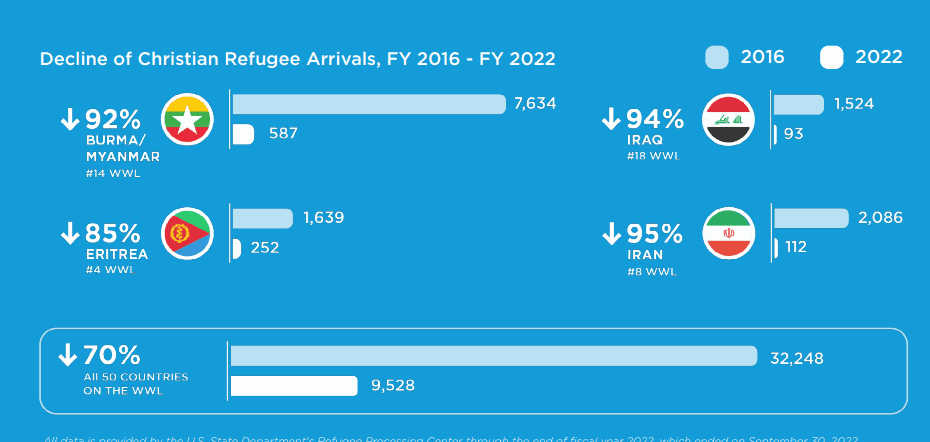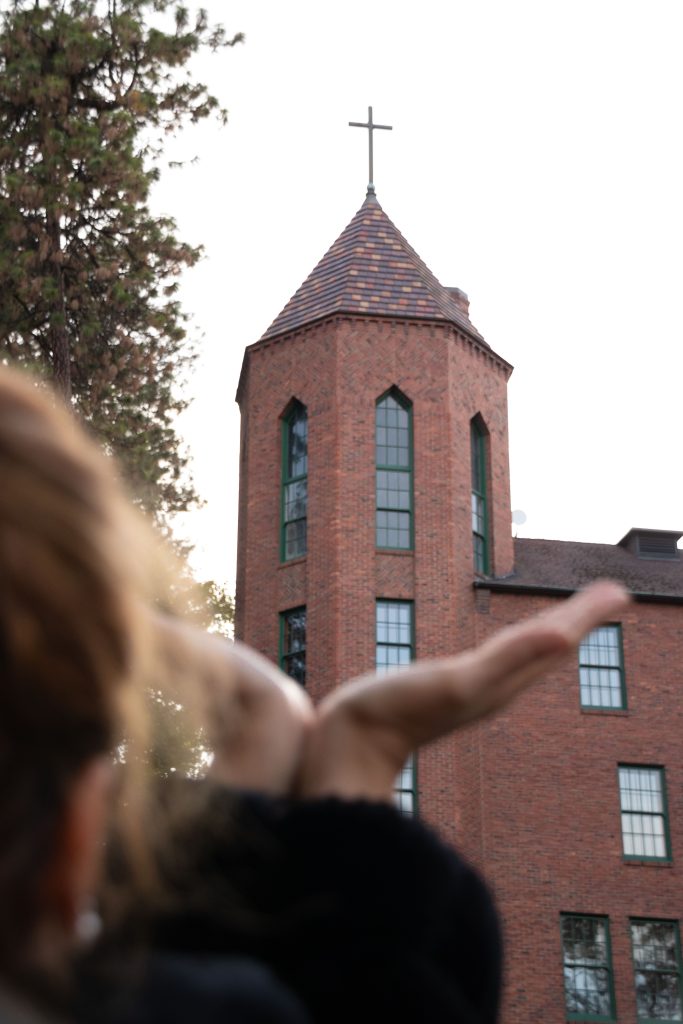Souzan held a Bible study in her home. A seemingly benign, everyday activity.
Except… Souzan lived in Iran. She had been secretly teaching the Bible in her home for years when one of her friends brought two new friends. Souzan didn’t know these new people, and she wasn’t sure of their motives. Did they want to learn about the Bible and become Christians or what was their purpose? Soon, both she and her husband began to notice that they were being watched.
“Those people reported us to the government. My husband was very smart, and he says, ‘Souzan, we must leave because they are going to come and catch you for teaching Bible study in our home.’
“It is very dangerous for a Muslim to become a Christian. It is against the law. They can kill you.”
Iran is currently considered one of the top 10 most dangerous countries in which to be a Christian. (“Persecuted Christians around the World Need the U.S. to Be a Safe Haven,” Newsweek, October 13, 2023) Share on XReligious Persecution
Maryam Rostampour-Keller, a Christian, Iranian-American, who was imprisoned in Iran for her faith, recently wrote in Newsweek: “Under Sharia Law, Muslims who convert to Christianity are considered apostates and can face the death penalty or life imprisonment… Additionally, Christians have their financial assets seized by the state, along with being banned from attending schools and owning businesses, blacklisted by employers and lose custody rights.” (Newsweek, ibid)
While religious persecution of Christians appears to be on the rise in Iran and other places, resettlement of persecuted Christians in the United States is decreasing.
“Opportunities to seek refuge in the United States have narrowed. Since 2016, there has been a 70 percent decrease in the number of Christians resettled as refugees from the top countries perpetuating religious persecution. And last year, a mere 112 Christian refugees from Iran were resettled in the U.S.” (Newsweek, ibid)

Flight to Indonesia
Leaving behind their four furniture stores, two apartments, three cars and most of their belongings, Souzan and her family fled to Indonesia on a one-month visa. They were only able to take $4,000 and a suitcase of belongings.
Indonesia was meant to be a short-term stop on their way to a new permanent home in a third country but ended up being their “home” for 12 years. Not party to the 1951 Refugee Convention, Indonesia is not an easy country in which to be a refugee. Living there, Souzan and her family were not permitted to work, go to school or drive. (Seti and William did go to school “off the record” but were not allowed to obtain diplomas or certificates. Still, they worked hard to learn English and were eventually able to help support the family by teaching English. Again, off the record.) They did not have legal documentation or any legal way to support themselves.
“After we fled to Indonesia, life was very hard. Very hard. Very stressful,” Souzan said. Seti added that the high level of pollution (Jakarta, the capital city where they lived, has been named the most polluted city in the world) aggravated her respiratory issues. After walking anywhere, she would be sick for weeks at a time.
Having fled Iran in 2012, they were granted an interview with UNHCR in 2013. In 2014, their application under Souzan’s husband’s name was rejected, and there was no opportunity for his case to be reheard. They were stuck.
“At that time,” Souzan said, “I just prayed and asked God, ‘Please open the way.’ After eight years, my case was finally opened.” In 2019, Souzan applied for resettlement under her own name. Her application was approved, and her children could be resettled along with her but not her husband. (Souzan asks for prayer for her husband and that he might be able to come to the United States in the near future. His health is poor, and it is hard for him to be separated from the rest of his family.)

Religious Freedom
While her husband is a new Christian, Souzan’s family have been Christians for generations. They are ethnically Assyrian, a people group who consider themselves to be among “the first Gentile Christians” (Christianity Today, March 1, 2021).
“All of my family is Christian, but we have a problem in Iran because we don’t have a church. We cannot go to the church and read the Bible. Especially in the city of Mashhad. I lived in Mashhad.”
Souzan and her family did go to church in Indonesia and were helped by the church there in many ways. The pastor allowed Souzan to teach kindergarten at the church school and paid her off the books.
Indonesia needed English teachers, and so William and Seti were eventually able to teach, but they had to keep their identity as refugees a secret. “Every time we went to work,” Seti said, “we were stressing that immigration might come.”
Souzan, William and Seti arrived in Spokane on September 26, 2023. On October 1, five days later, they were in church. “For 12 years,” Souzan said, “I have been waiting for this moment.”
“Finally, we are able to live right,” Seti said. “We have rights. In Indonesia, we didn’t have any rights because we are refugees. We have to keep silent, but here, no, it’s not like that. Everyone helping each other.”
Souzan contrasted life in the United States with life in Iran. “My life in Iran was very good because I have everything. I live like rich people… But, BUT, we cannot go to church. We cannot pray.”
Souzan chose to trade comfort for freedom.
“I chose the freedom – free to pray, free to go anywhere. Especially for my children.”
